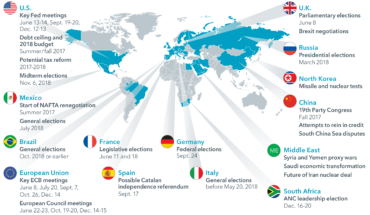Geopolitical events have the potential to significantly influence the stock market, creating ripples that can affect investor sentiment and market dynamics. In this comprehensive article, we explore the intricate relationship between geopolitical events and the stock market. From understanding the nature of geopolitical events to examining their impact on market volatility, investor behavior, and sector-specific trends, we delve into the ways in which these events shape the stock market landscape. By grasping the dynamics of geopolitical events, investors can gain valuable insights to make informed decisions and navigate the ever-evolving global financial markets.
Geopolitical Events and Their Significance
Geopolitical events encompass a wide range of political, economic, and social events that occur on a global scale. These events include political elections, trade disputes, wars, terrorism, natural disasters, and policy changes. Understanding their significance is crucial for comprehending their impact on the stock market:
- Diversification: Maintain a well-diversified portfolio across different sectors, asset classes, and geographical regions. Diversification can help mitigate the impact of geopolitical events on specific investments and reduce overall portfolio risk.
- Market Uncertainty: Geopolitical events often introduce uncertainty into the market, as they can disrupt economic stability, alter trade relations, or change government policies. Such uncertainty can lead to increased market volatility and affect investor sentiment.
- Investor Risk Perception: Geopolitical events can alter the perception of risk among investors. Events that are perceived as negative or threatening to economic stability may prompt investors to adopt a more cautious approach, leading to changes in investment behavior and market trends.
Geopolitical Events and Market Volatility
Geopolitical events can trigger heightened market volatility due to the uncertainty they introduce. The following are key aspects of the relationship between geopolitical events and market volatility:
- Flight to Safe Havens: During times of geopolitical uncertainty, investors often seek refuge in safe-haven assets, such as gold, government bonds, or currencies considered stable. This flight to safety can lead to price movements in these assets and affect overall market volatility.
- Sector-Specific Impacts: Geopolitical events can have varying impacts on different market sectors. For example, defense and security-related sectors may experience increased demand during times of conflict, while industries reliant on international trade may face challenges during trade disputes.
Geopolitical Events and Investor Behavior
Geopolitical events can significantly influence investor behavior and decision-making. Here are some ways in which these events shape investor behavior:
- Risk Appetite: Geopolitical events can impact investors’ risk appetite. Events that are perceived as positive or beneficial to economic stability may increase risk appetite and encourage investors to take on more risk. Conversely, events that are seen as negative or disruptive may lead to a more risk-averse approach
- Long-Term Investment Strategies: Geopolitical events can prompt investors to reassess their long-term investment strategies. Major geopolitical shifts, such as policy changes or international agreements, can create new opportunities or threats that may necessitate adjustments in investment portfolios.
Strategies for Navigating Geopolitical Events
Navigating the stock market during geopolitical events requires careful consideration and adaptability. Here are some strategies to help investors effectively manage their investments:
- Stay Informed: Stay updated on geopolitical events and their potential implications for the global economy and specific market sectors. Regularly monitoring news, expert analysis, and economic indicators can provide valuable insights.
- Long-Term Perspective: Adopt a long-term investment perspective and avoid making knee-jerk reactions to short-term geopolitical events. Focusing on the long-term fundamentals of investments can help withstand short-term market volatility.
Geopolitical events wield a considerable influence over the stock market, affecting investor sentiment, market volatility, and sector-specific trends. By understanding the significance of geopolitical events, monitoring their impact on market dynamics, and employing appropriate strategies, investors can navigate the complexities of the stock market more effectively. Stay informed, adapt your investment approach, and leverage the power of understanding geopolitical events to make informed decisions in the ever-evolving global financial landscape.


Hi,
I wanted to let you know about our newly launched comprehensive course that guides you step-by-step on how to create profitable faceless YouTube channels using the power of AI. This means you can generate engaging video content quickly and efficiently, opening up new income streams and without ever physically appearing on camera.
Key features:
High-quality HD training videos covering AI-powered content creation, automation, and monetization
Comprehensive training guide with step-by-step strategies for building and scaling faceless YouTube channels using AI
Ready-to-sell marketing materials to help you launch instantly
Fully optimized promotional content to boost conversions
Complete PLR rights—Rebrand and resell as your own
Lead generation on autopilot
Ready to explore this exciting opportunity?
Learn more here: https://furtherinfo.info/faceless
Kind regards,
Dirk